Live In Person Courses

Maximizing Function in Neurology for Older Adults: Stroke, Parkinson’s, Fall reduction, Gait and Balance
Formerly - Neurological Examination and Intervention forr the Older Adult
Dr. Carole B. Lewis
PT, DPT, MSG, MPA, PhD, GCS, GTCCS, TRC/CTR, FSOAE, FAPTA
20 Contact Hours
This seminar will provide participants with the most up-to-date information on neurological rehabilitation of the older adult seen in any setting. Join Dr. Carole Lewis as she demonstrates and explores examination tools and intervention protocols/ideas designed and most appropriate for older patients with diagnoses of Parkinson’s disease, stroke, and gait and balance disorders. Cutting edge Information on the physiology of aging will also be presented as well as a special feature on burnout. The 300-page handout includes 6,000 current medical references, detailed examination forms, outcome measures, intervention techniques, protocols and sample home exercises that can be used immediately with patients.
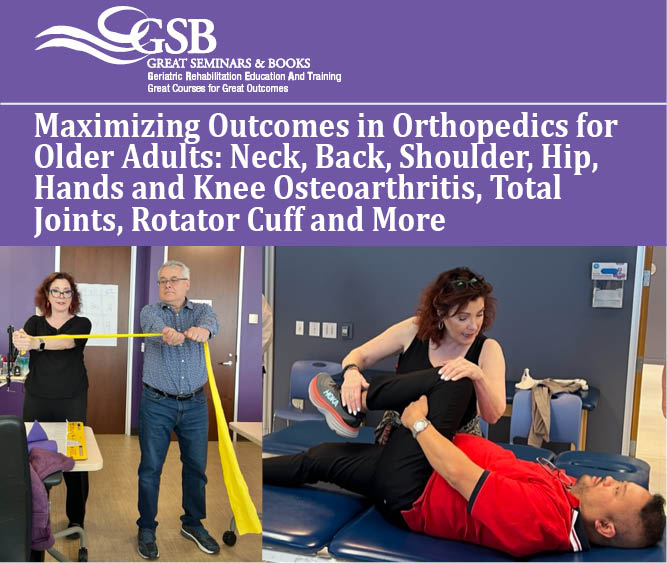
Maximizing Outcomes in Orthopedics for Older Adults: Neck, Back, Shoulder, Hip, Hands and Knee Osteoarthritis, Total Joints, Rotator Cuff and More
Formerly - Orthopedic Examination and Intervention for the Older Adult
Dr. Carole B. Lewis
PT, DPT, MSG, MPA, PhD, GCS, GTCCS, TRC/CTR, FSOAE, FAPTA
20 contact hours
Learn new evidence-based examination and creative intervention techniques for a myriad of orthopedic problems of frail to robust older persons. Dr. Carole Lewis’ all new handout contains all of the seminar slides, assessments, protocols, and thousands of references and tools. This is the most comprehensive geriatric orthopedic course in the country.
Participant Comment: “I came to this course with my wife, thinking it would be a review and it definitely was not. I have my OCS and I learned many new innovative and research-based techniques that I plan to use with my patients.”
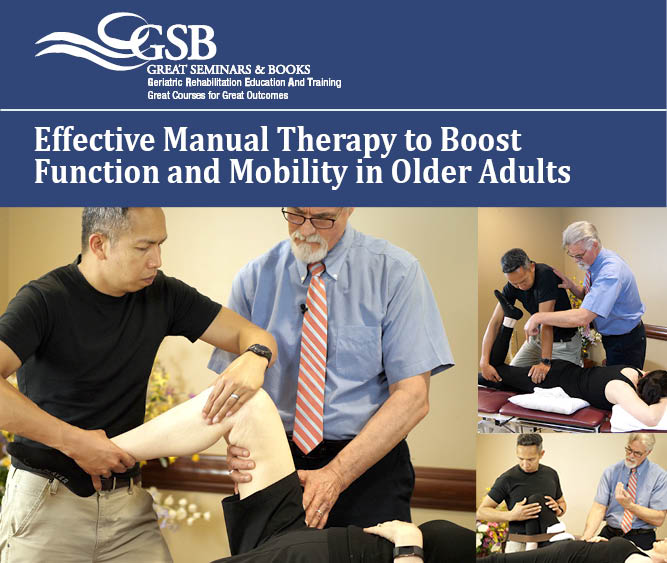
Effective Manual Therapy to Boost Function and Mobility in Older Adults: An Amazing Hands On Course
Formerly - Effective Manual Therapy to Treat Older Adults: What works?
Dr. Dennis Welling
PT, MTC, DPT, FSOAE
20 Contact Hours
Do you ever wonder why your older patients are not improving? Is there something you could do to make them better in a time efficient fashion? What about some great manual therapy interventions? Dr. Dennis Welling, an experienced and dually certified manual therapist, will show you some of the most efficient and effective manual techniques you can use quickly and effectively with older adults. He will briefly present the relevant studies with demonstrations and tons of time to practice and learn these simple, but effective techniques. Additionally, he will present the common mistakes and suggestions for proper execution of this important modality. You will leave feeling competent in adding many different manual techniques to your current rehabilitation program to get great results.
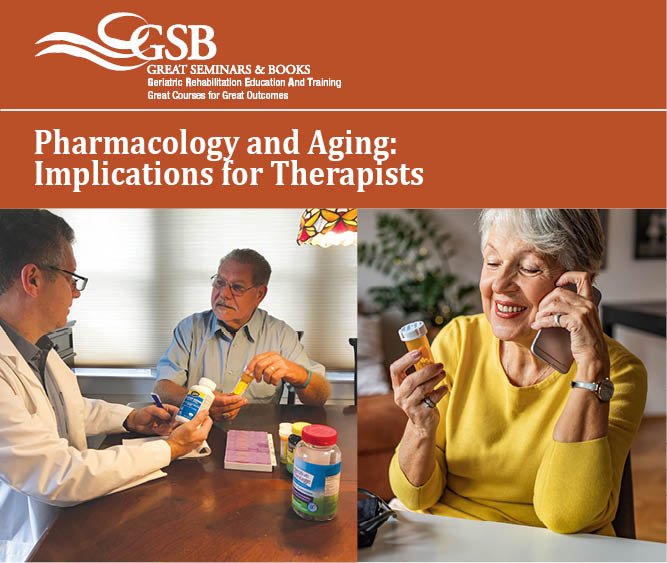
Pharmacology and Aging: Implications for Therapists
Formerly - Clinical Pharmacology: Implications for Therapists Working with Older Adults
Kenneth Miller
PT, DPT, PhD, FNAP, GCS, CEEAA
20 Contact Hours
Enhance Your Preparedness: Learn to Skillfully Assess and Address Medication Impact on Patient Function. Equip Yourself to Navigate the Influence of Medications on ADLs and IADLs.
This seminar provides participants with the necessary tools and information required to incorporate pharmacology and medication management into practice with older adults. You will learn to identify and effectively manage polypharmacy and learn techniques to help monitor patients for medication desired effects, side effects and help physicians and nurses safely manage medication use. Evidence-based tools and patient education resources will be provided to assist the participant with safe medication use. The course manual is a fabulous resource for daily practice.

Evidence-Based Management of Patients with Dementia
Nicole Dawson
PT, PhD, GCS
20 contact hours
Do you know which aspects of cognition are the strongest throughout the progression of dementia? Do you feel confident in your ability to use your patient’s cognitive abilities to promote a successful episode of care? That’s what this course is about. While patients with dementia pose unique challenges to rehabilitation professionals, the potential benefits from quality therapy is astounding.
This course will provide a better understanding of cognitive aging and build your skills and confidence in your ability to improve the quality of life of your patients with dementia. Barriers to treatment will be addressed along with best practice and evidence-based approaches to overcome the challenges to improving functional outcomes for these patients. The different types of dementia will be discussed, highlighting effective strategies to maximize patient outcomes. Understanding the use of a strength-based approach will be emphasized to help you and your staff better treat this growing and unique group of patients.

Exercise Can Change the Parkinson Brain:
Improving Mobility and Function
Valerie A. Carter
PT, DPT, NCS, GCS
20 contact hours
Valerie Carter is one of the most entertaining yet top experts in the field of Parkinson’s Disease. She owns her own successful clinic, does her own outstanding research and is one of the country’s most animated speakers on this topic. This course has tons of research based clinically useful information for the clinician seeking to provide better care to their patients with Parkinsons Disease. This course will cover pathophysiology, etiology and differential diagnosis, as well as medications. The remainder of the course will be a deep dive into appropriate tests and measures and the most effective interventions for patients aging with Parkinson Disease.

Improving Function through Innovative Interventions for the Most Common Problems of Older Adults
Formerly - Interventions for Older Adults Across the Continuum
Linda McAllister
PT, DPT, GCS, GTCCS, CEEAA, CEAGN, FSOAE
20 contact hours
Dig deep into several diagnoses commonly encountered in the older population and how to address them effectively at multiple levels of function. This course will go over an abundance of interventions based on current evidence. Instead of rote lecture, this course will provide time to practice these creative and innovative approaches for immediate use in the clinic.
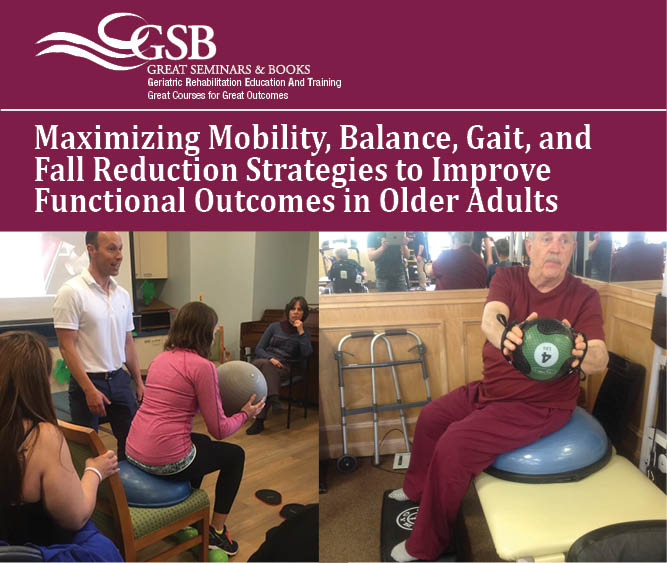
Maximizing Mobility, Balance, Gait, and Fall Reduction Strategies to Improve Functional Outcomes in Older Adults
Trent Brown
MOT, OTR/L, ATP, CFPS, CGCP, BCG
20 contact hours
How can I improve quality of life and participation in meaningful activity while meeting the demands of the industry? How can I effectively evaluate and provide treatment strategies addressing stability, mobility, falls, confidence, gait, and mobility with my clients in their specific context?
If these questions are occupying your thoughts these days, then this innovative, evidence-based course is for you. You’ll learn new perspectives, at least a dozen assessment tools that provide objective data, and 2-3 dozen treatment strategies. And…you’ll be engaged and energized.
Trent Brown is known for making learning fun. His course is based on solid evidence, but that doesn’t mean it isn’t engaging. He is crazy creative! To make sure that you leave with practices that can be put to use safely tomorrow, he devotes 6-7 hours of this course to lab work. You will learn, practice, get feedback, and then practice again until you have mastered the skills.
Trent’s course manual is referred to as a picture book because it includes pictures of deficits, pictures of research results that address the problem (actual pictures, not just words), and then pictures of a therapist using assessments and interventions while working with a patient. Participants LOVE the picture book and many have told Trent that they attend his course because they’ve seen their colleagues’ picture book.
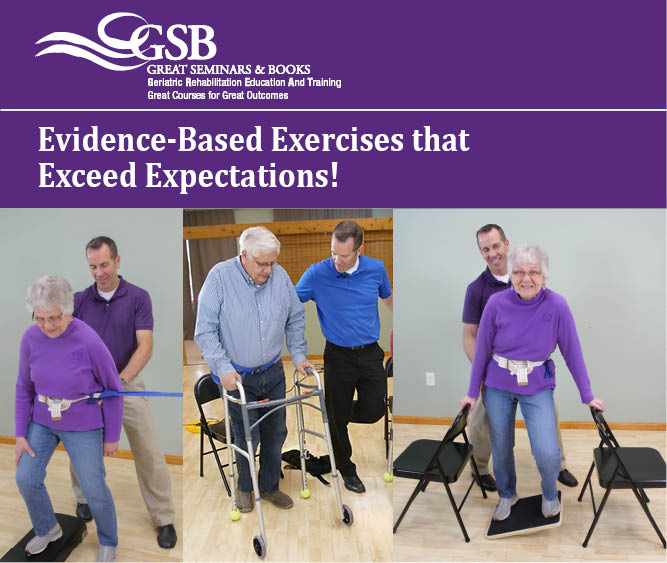
Evidence-Based Exercises that Exceed Expectations!
Formerly - Therapeutic Exercise for the Older Adult
Mark Traffas
PT, GTCCS, FSOAE
20 Contact Hours
Exercise is our most effective modality, so why not learn about the latest most innovative and evidence-based interventions that are currently available. Mark Traffas, who is a working clinician and educator, is gifted in his ability to take research and convert it into clinically usable information. You will leave with tons of new, creative and effective exercises for every joint in the body as well as for patients with stroke, Parkinson’s disease, balance impairments and so much more.
Exercising older patients can present a unique challenge to therapists. Take on that challenge and give your patients the best care you can. Take this course for tools you can use immediately!

Taking Balance to the Limits
Janene Barber
PT, GTCCS, FSOAE
20 Contact Hours
Do you feel at times that you have designed and delivered the best gait and balance program and yet your patients still have some problems with their balance?
This course goes beyond all you have learned about the effects of speed, strength, and range of motion limitations as causes for balance dysfunction. You will leave with an in-depth knowledge and skill in the postural dyscontrol, somatosensation and vestibular arenas. The instructor has taught and treated extensively in this area with astounding results with her patients and clinicians. Her skills in this area are unparalleled.